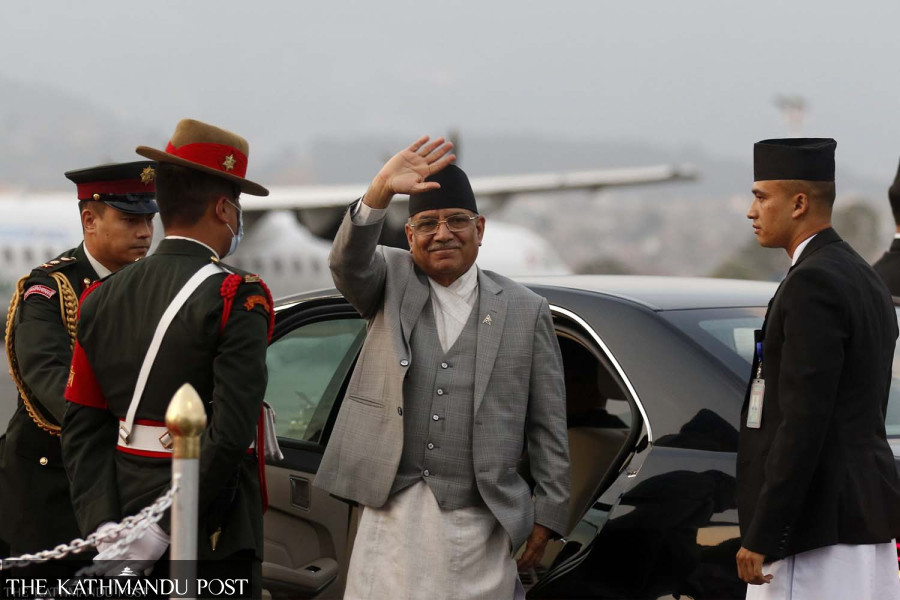National
Amid NAM’s struggle for relevance, Dahal heads to Uganda
The Non-Aligned Movement should carefully reassess itself or face the risk of oblivion, say Nepali analysts
Anil Giri
Prime Minister Pushpa Kamal Dahal is leaving for Kampala, Uganda on Wednesday night leading a Nepali delegation to the 19th Summit of Heads of State and Government of the Non-Aligned Movement (NAM) being held from 19 to 20 January.
A team of senior government officials including Foreign Secretary Sewa Lamsal have already reached the East African nation and participated in a meeting of senior officials.
Nepal is a founding member of NAM, a group of countries that opted to stay away from major power blocs. Since its inception in 1961, there have been many changes in the world—the fall of the Soviet Union, the end of the Cold War, the formation of NATO(incepted in 1949), the rise of China, US-led initiatives like the Indo-Pacific Strategy and Quad (a strategic security dialogue between Australia, India, Japan and the US), Covid, ongoing Russia-Ukraine and Israel-Hamas wars, great geopolitical shifts, among other major developments.
The world is also facing several other challenges like diseases, climate crisis, migration, terrorism, and social inequality. Amid the unprecedented global crisis, and at a time the role of the United Nations is shrinking, NAM is holding yet another summit meeting.
In this context, does NAM still carry the same moral weight? In fact, is it even relevant? Views are divided, but many believe NAM should reassess itself or risk oblivion.
“NAM has been through many ups and downs through the years and as of today, it has lost its relevance,” said former foreign minister Narayan Khadka. “As new challenges emerge, the non-aligned movement has lost its economic, political, and strategic relevance. In fact, it has become no more than a forum to criticise America and its allies.”
Khadka himself participated in a NAM ministerial meeting in 2022.
Leaders and delegates from around 200 countries will assemble in Kampala for the 19th summit that kicked off on Monday. According to the organisers, about 4,000 officials and leaders from different member states and institutions are expected to take part in the weeklong summit. They will discuss pressing global issues and cooperation among member states, and issue two outcome documents on political and socioeconomic situations.
Ahead of the summit, General Jeje Odong, the foreign minister of Uganda, said the world needs multilateralism and solidarity to face its many challenges.
“Today, we are faced with several challenges, including armed conflicts in different parts of the world, food insecurity, migration, unemployment, health pandemics, climate change, and terrorism... We also recognize challenges in financing for development and the issue of debt burden that paints a depressing global economic outlook. It is, therefore, crucial for us to address existing, new, and emerging issues collectively and in the interest of our membership, for the good of mankind,” Odong stated.
Nepal’s foreign policy is guided by the principle of non-alignment, which is enshrined in the constitution.
“NAM emerged as the ‘third force’ but it has lost its objectivity at a time when the world’s peace, stability, and security are under threat,” said Khadka. “The present-day architecture of NAM is unlikely to serve its purpose although its principles are still relevant.”
On Nepal’s part, Prime Minister Dahal is scheduled to address the plenary of the summit on the theme of “Deepening Cooperation for Shared Global Affluence” on 19 January. Later in the day, he will attend a state banquet hosted by the Ugandan President Yoweri Museveni in honour of visiting leaders and delegates.
On the margins of the summit, Dahal will hold bilateral meetings with heads of state and government, and other dignitaries.
“Nepal is a founding member of the Non-Aligned Movement and has been actively participating in all NAM summits since its inception. Principles of non-alignment make for one of the basic tenets of Nepal’s foreign policy,” said the foreign ministry statement while announcing the visit of the prime minister to the NAM summit.
In his speech, the prime minister will suggest ways to make NAM more relevant in addressing both existing and emerging global challenges, Rupak Sapkota, foreign relations adviser to the prime minister, said.
“Some of the nations that were in leading roles during the inception of the non-aligned movement are themselves drifting away from the policy of non-alignment. The context, objectives, and principles of NAM are very much contextual, but its relevance is being questioned. Members should work to ensure its relevance so that this forum can evolve into an effective troubleshooter,” said Sapkota.
Amid NAM’s apparent failure to play effective roles in mitigating conflicts, many members like India are gradually drifting away from its core values and are starting to take sides or to adopt multiple alignments.
Some observers like former foreign secretary Madhu Raman Acharya think that NAM has been hijacked by developing nations like Cuba, Venezuela, and Uganda. “It’s hard to see a bright future for the movement,” Acharya said.
“While some of its principles are still relevant, NAM itself has diminished in significance,” said Acharya, who has participated in several NAM meetings in various capacities.




 8.22°C Kathmandu
8.22°C Kathmandu














